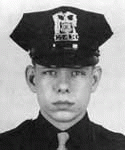A hush filled the packed chambers of the Nebraska Supreme Court as attorney Robert Bartle played a chilling 50-second tape recording of the emergency call that lured Omaha police officer Larry Minard to his 1970 ambush-bombing death. A man's deep gritty voice could be heard making a report about a woman screaming at a vacant house.
The Omaha World-Herald described the killer's voice as "deep and drawling." Attorney Bartle told the justices, "That isn't the voice of a 15-year old. That is not the voice of Duane Peak."
Duane Peak was a teenager who confessed to planting the bomb and making the deadly phone call. Peak also implicated Black Panther leaders Ed Poindexter and Mondo we Langa (formerly David Rice) in exchange for his own lenient treatment and became the state's murderous star witness against the two Panthers. However, if Peak did not make the call as he claimed, the case against Poindexter and Langa unravels leaving an unidentified killer on the loose.
The scratchy tape, never heard by the jury that convicted the Panther leaders, has a long, troubling history and was kept under wraps by order of J. Edgar Hoover, then-director of the Federal Bureau of Investigation.
Hoover had declared a secret war against the Black Panther Party and other domestic political groups code-named Operation COINTELPRO. The "no holds barred" tactics of COINTELPRO directed at the Panthers had a lethal ferocity with false arrests and convictions as one of the techniques. Hoover's agents had already targeted Poindexter and Langa when the August bombing claimed Minard's life.
The FBI arrived at the crime scene soon after the blast and helped direct the investigation. The Omaha Special-Agent-in-Charge worked directly with Asst. Chief of Police Glen W. Gates who led the murder investigation. While uniformed officers began a massive sweep of Omaha's Near-Northside neighborhood arresting dozens of people and technicians sifted through blast debris looking for clues, Gates met with the FBI and agreed to send the tape recording of the killer's voice to the FBI crime laboratory in Washington, D.C. to identify the caller.
The Omaha World-Herald headline told the public "Voiceprint in Bombing to FBI Lab". A police spokesman told the paper the tape would be a "good investigative tool". But the tape was sent to the FBI lab with unusual instructions to not issue a formal report and instead orally inform the Omaha FBI office of the results of analysis. The COINTELPRO hidden agenda was not to catch the actual killers of Minard but instead make a case against Poindexter and Langa.
When Ivan Willard Conrad, director of the crime lab, got the memo requesting a secret report on the tape he spoke with Hoover by phone two days after the bombing. Before Minard's body was buried, Hoover gave the command to withhold an official report thus limiting the search for the policeman's killer. Conrad scrawled on his copy of the COINTELPRO memo, "Dir advised telephonically & said OK to do" followed by his initials and date.
Conrad followed Hoover's orders and issued no formal findings on the identity of the unknown caller. However, the Omaha Special-Agent-in-Charge sent another COINTELPRO memo to Hoover two months later in October. "Assistant COP GLENN GATES, Omaha PD, advised that he feels any use of this call might be prejudicial to the police murder trial against two accomplices of PEAK and, therefore, has advised that he wishes no use of this tape until after the murder trials of PEAK and the two accomplices have been completed."
The hearing was in the austere chambers of the state high court located in the Nebraska Capitol and was filled with supporters of Poindexter and Langa, many wearing T-shirts indentifying the 'Omaha Two' as political prisoners. Questions from the bench focused on the custody of the tape and who was to blame for withholding the recording from the jury.
Assistant Attorney General James Smith argued everyone knew there was a tape and failure of the defense attorneys to introduce the tape at trial was a tactical decision by lawyers for the two Panthers. Bartle's argument is that the prosecution should have provided the tape to defense attorneys as a part of discovery. Regardless of who was at fault for the jury not getting to hear the killer's voice Bartle said, "The whole point to Poindexter is that he was still deprived of the use of the tape."
Smith countered that Frank Morrison, a former-Nebraska governor and Poindexter's court-appointed lawyer, made a tactical decision and Poindexter had to live with it. However, not long before his death Morrison gave a deposition in 2003 about his role in the case and he admitted making mistakes that led to an unfair trial. Morrison's strongest statement about the matter came earlier in 1997 in the form of a public letter.
"As a citizen and former prosecutor, and Governor of this state, I abhor, detest and condemn the cowardly, cruel, and unjustified murder of officer Minard. My heart aches for his family. The guilty parties should pay the penalty. The self-confessed murderer was turned loose after a slap on the wrist."
"I now believe and always have believed that the true role of law enforcement is truth. Real justice can only be built on truth. I hope the Congress and other policy makers will reestablish this policy. I feel both I and the system failed Ed Poindexter."
(Note: You can view every article as one long page if you sign up as an Advocate Member, or higher).





